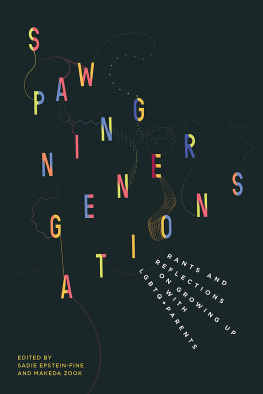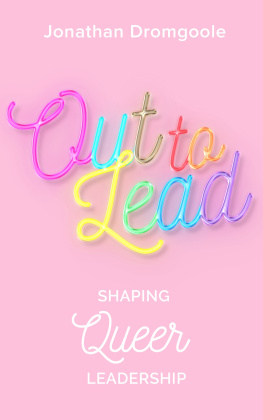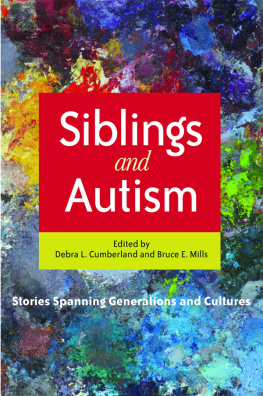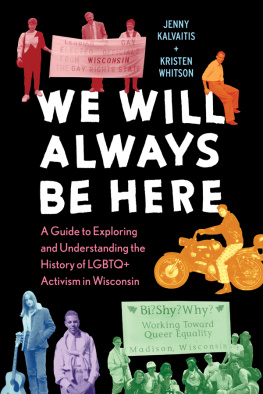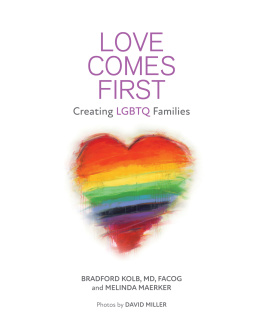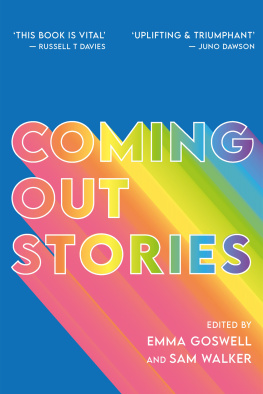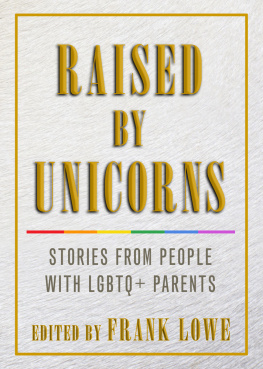Spawning Generations
***
Copyright 2018 Demeter Press
Individual copyright to their work is retained by the authors. All rights reserved. No part of this book may be reproduced or transmitted in any form by any means without permission in writing from the publisher.
Funded by the Government of Canada
Financ par la gouvernement du Canada

Demeter Press
140 Holland Street West
P. O. Box 13022
Bradford, ON L3Z 2Y5
Tel: (905) 775-9089
Email:
Website: www.demeterpress.org
Demeter Press logo based on the sculpture Demeter by Maria-Luise Bodirsky, www.keramik-atelier.bodirsky.de
Printed and Bound in Canada
Cover design: Studio Le Burrow Inc. www.leburrow.com
eBook: tikaebooks.com
Library and Archives Canada Cataloguing in Publication
Spawning generations : rants and reflections on growing up with LGBTQ+ parents / Sadie Epstein-Fine and Makeda Zook, editors.
Includes bibliographical references.
ISBN 978-1-77258-163-8 (softcover)
1. Children of sexual minority parents. 2. Children of gay parents. 3. Parent and child. I. Epstein-Fine, Sadie, 1992-, editor II. Zook, Makeda, 1986-, editor
HQ777.8.S63 2018 306.8740866 C2018-901123-8
Spawning Generations
Rants and Reflections on Growing Up with LGBTQ+ Parents
***
EDITED BY
Sadie Epstein-Fine and Makeda Zook
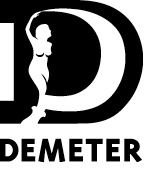
DEMETER PRESS
For all the queerspawn, gaybies, queerlings and rainbow children of past, present, and future generations.
And to dyke moms, femme moms, butch moms, gay dads, bear dads, leather daddies, trans parents, queer parents, genderqueer parents, poly parents, non-bio parents, birth parents, adoptive parents, fairy godparents, spunkles, funkles, donors, surrogates, chosen family, blood family, community. Thanks for raising us.
Table of Contents
Acknowledgements
Deep gratitude for our many momsRachel, Lois, Alice, Annette, and Krinthank you for encouraging and inspiring us every step of the way. A very special thanks to Rachel Epstein who has been instrumental in bringing this collection to life. Rachel has been both our cheerleader and our coach all the way through this process. Thank you for editing many drafts of our introduction and laughing/crying with us at midnight.
A huge thank you to Dr. Andrea OReilly and everyone at Demeter Press for approaching us with the idea and helping to see it through. Thank you for your patience and dedication. We would also like to thank the independent reviewers and other people we anonymously consulted in the fields of gender, sexuality, and feminist studies. Thank you for helping to strengthen this collection with your expertise.
And finally, the biggest shout-out goes to our contributors for embarking on this journey with us. We are grateful for every contributors willingness to take the risk of diving deep into their stories, and for so generously giving of their time, energy, creativity, and patience. This is your book.
You young ones
Youre the next ones
And I hope you choose it well
Though you try hard
You may fall prey
To the jaded jewel.
Testimony, Ferron
***
Why bastard? wherefore base?
When my dimensions are as well compact,
My mind as generous, and my shape as true,
As honest madams issue? Why brand they us
With base? with baseness? bastardy? base, base?
Edmund in King Lear , William Shakespeare
Introduction
Finding Each Other
MAKEDA ZOOK AND SADIE EPSTEIN-FINE
A S KIDS OF QUEERS who grew up in Canada in the nineties, we can recall all of two childrens books that reflected our families. It often felt like we were disparate pieces of weirdness, scattered onto the monotone background of what family should look like. We were on the frontlines of classrooms and schoolyards explaining our families to our peers and teaching our teachers about what sensitivity, inclusion, and support look like. As we grew up, the gayby boom expanded, and as the definition of family was slowly redefined, we began to feel incrementally less scattered. We grew up sitting on panels, assuring prospective queer parents that we really do turn out all right, and that despite the homophobia that exists in the world, we do not grow up to resent our parents. We have watched our queer and trans friends attend the LGBTQ2+ family planning courses that our moms helped launch, become parents themselves, and then helped them find childrens books for their wee ones depicting families they could recognize as their own.
As the world of queer and trans parenting has grown, boomed even, so too have the childrens and parenting books. However, this boom and the books that accompanied it never had an easy or straightforward path. In Canada, in 1997, Ashas Mums by Rosamund Elwin and Michele Paulse was one of three books about same-sex families initially banned by a local school board in British Columbia. The issue was finally resolved in 2002 with a Supreme Court of Canada decision allowing the three books in the school board. Heather Has Two Mommies by Lesla Newman was at the heart of similar controversies in the United States.
Finding these children books about queer families was like finding a needle in a haystack. It was (and still is) even rarer to find a book written by kids of queers about being kids of queers. When we were approached to compile and edit this collection, we were offered both an incredible opportunity and a huge responsibility. It was an opportunity to create a vehicle for a spectrum of queerspawn voices to be heard and a responsibility to ensure that queerspawn readers will recognize themselves within this spectrum.
No book about queerspawn can fail to acknowledge the foundational queerspawn texts that do exist. Most notably, Abigail Garneran activist, speaker, and writer of queerspawn experiences since the ninetiesinterviewed adult queerspawn from across the United States for her 2004 book Families Like Mine . In 2000, Noelle Howey co-edited (with Ellen Samuels) a collection of essays, Out of the Ordinary, about growing up with queer and trans parents. Howey also authored Dress Codes , a memoir about growing up with a trans parent. In Canada, Alison Wearings Confessions of a Fairys Daughter (2013), a memoir about growing up in the eighties with a gay dad, has also garnered critical acclaim. In the United Sates, Alison Bechdel has written and illustrated Fun Home (2006)a memoir in the form of a graphic novel about her closeted fathers suicide after her own coming-out. Fun Home is now an award-winning Broadway musical. In 2013, Alysia Abbott wrote Fairyland about growing up with a bisexual father in the 1970s and 1980s San Francisco gay scene, amid the AIDS epidemic. These books, written by and for queerspawn, are a relief in a mainstream literary and pop culture crowded with stories written on behalf of us, but not by or for us.
The first Hollywood film to feature queerspawn as leads was The Kids Are Alright . In this film, the moms (wealthy, white, suburban lesbians) are going through a rough patch in their relationship. When the sperm donor enters the scene, one of the moms has sex with him, which shifts the focus in unrealistic ways from the queer family and lesbian couple to the heterosexual affair; the straight sex scene becomes the only hot sex scene in this so-called queer movie. Although The Kids Are All Right was widely criticized, most scathingly (and appropriately so) by queer audiences, the screenwriters did capture with some acumen certain aspects of the kids experiencesincluding their different reactions to searching for, and finding, their sperm donor, the daughters struggle with perfectionism, and the ways that queer parents can unknowingly pressure their kids to act as poster children. The writers did get a few things at least somewhat all right.

